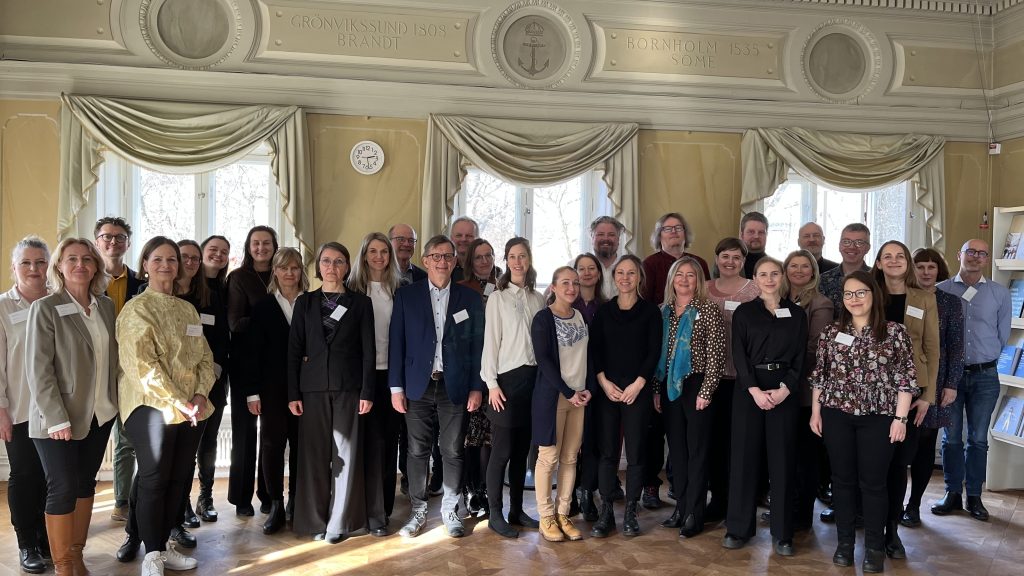How can we create an inclusive digital transition in the Nordic-Baltic societies? How can we increase digital literacy and digital skills to help more people participate in the digital economy and society?
On the 23rd and 24th of March, we had the pleasure of gathering 35 practitioners and researchers, representing almost all parts of the Nordic-Baltic Region, for our “Digital Inclusion in Action” kick-off – a research project aimed at understanding what the barriers and enablers to digital inclusion in the region are, and how these affect different parts of society. Often being presented as the “silver bullet” to today’s complex societal challenges, digitalisation brings many underestimated exclusion issues in its wake. As a researcher, my area of interest and expertise lies at the intersection of digital technology, policy, and social practices – so I was looking forward to a thought-provoking couple of days!
Six speakers to highlight problem and possible solutions
Disability digital divide – knowing what you don’t see – Jan Gulliksen (KTH), opened the event with his talk that framed a concept central to digital inclusion: accessibility. The speaker highlighted the variety of individual characteristics and capabilities that can affect one’s ability to use and benefit from digital services, focusing in particular on digital exclusion linked to disability. In this context, the speaker also discussed how students with disabilities need to be better integrated in the development and employment of digital tools.
“My mobile phone is my right hand”: (Digital) Security Needs of Refugees and Migrants in Sweden – Rikke Bjerg Jensen (Royal Holloway, University of London). The speaker of the second talk emphasized the need to gain a better understanding of everyday experiences of digital security when supporting the digital inclusion of immigrants in the region: “Why would immigrants trust the Nordic-Baltic governments? When they have learned the hard way that the same information you need to provide the government here, is the difference between life and death in your home country. “
Citizen-centered and inclusive digitalization: Supporting informal welfare work in the digitized state – Brit Ross Winthereik (DTU) was the third talk on the first day of the kick-off. Brit Winthereik offered interesting perspectives on the experiences of digital exclusion and support mechanisms that lie in the “grey zone”. By exploring the three concepts of “misfitting”, “interdependencies” and “workarounds”, the presentation invited the audience to reflect on the need for more qualitative data to better understand informal digital support that is being provided by e.g. nurses and teachers in the region and the human dimension of tech encounters in the public sphere generally.
Digital Inclusion and Adult Learning – Antra Carlsen & Johanni Larjanko (Nordic Network for Adult Learning) declared that improving accessibility is a crucial tool in the Nordic-Baltic region to allow for the region’s inhabitants to be actively involved in everyday democratic processes: “It’s not about learning how to use TikTok or Excel, its more about what we need to do in the Nordics to improve accessibility to be active citizens.”
DESI index and other Indicators to monitor digital Inclusion – Louise Palludan Kampmann (NextPuzzle/Digital Europe) and Anna Vasilevskaya (Nordregio). The fifth talk of the event given by part of the “Digital Inclusion in Action” project consortium looked at new ways to monitor digital inclusion in the region to support evidence-based policy making, another goal of the project. In this context, potential shortcomings of current European monitoring schemes were discussed, debating the challenge of presenting complex issues like digital inclusion through quantitative means. Together with the audience, we reviewed different indicators that need to be included in current national monitoring mechanisms to increase the visibility of digital inclusion issues.
The NOBID project and digital inclusion with regards to e-ID – Ismail Özkan (Norwegian Digitalisation Agency) completed the agenda of the second day. The presentation provided new insights regarding the challenges and opportunities of cross-border usage of e-IDs in the Nordic-Baltic region. Shedding light on issue areas such as identity matching, power of attorney and e-ID linked exclusion mechanisms, the talk triangulated the topic of eID usage and inclusion from an organizational, legal and technical perspective.
Following the keynotes, participants engaged in smaller group discussions, allowing them to share knowledge and provide valuable input for the further development of the project. Our group discussion touched on several topics, including the role and effect of various disabilities, aging populations, varying degrees in income and education, low trust in governments and private actors gathering information by digital means, historical differences in the region, trust and safety online, the use and misuse of AI technology in an inclusion context, cross-border communication, and the general need for more collaboration. Many emphasized the importance of putting the needs and experiences of marginalized groups at the center of digital inclusion policies.

Great potential for Nordic-Baltic added value
One of the project’s key objectives is the creation of a Nordic-Baltic platform for improved cooperation and knowledge exchange regarding digital inclusion policy and practices. Thanks to the contributions of our participants and the support from our Nordregians (Anna V., Louise, Leneisja and Maja), consortium partners (Digital Europe and the Nordic Welfare Centre) as well as the Council of Ministers for Digitalisation (MR-DIGITAL), the kick-off built a good starting point for this.
Overall, the kick-off for “Digital Inclusion in Action” proved to be a valuable foundation for addressing the complex issues surrounding digital inclusion. It was clear that all participants shared a determination to raise digital inclusion issues on the Nordic-Baltic political agenda and to reinforce cross-border knowledge exchange after the pandemic had put a halt to many shared learning practices.
I’m looking forward to continuing to work with this engaged and knowledgeable community and I’m excited to see the innovative solutions and collaborations that will emerge from this Nordic-Baltic platform for improved cooperation and knowledge exchange regarding digital inclusion policy and practices.